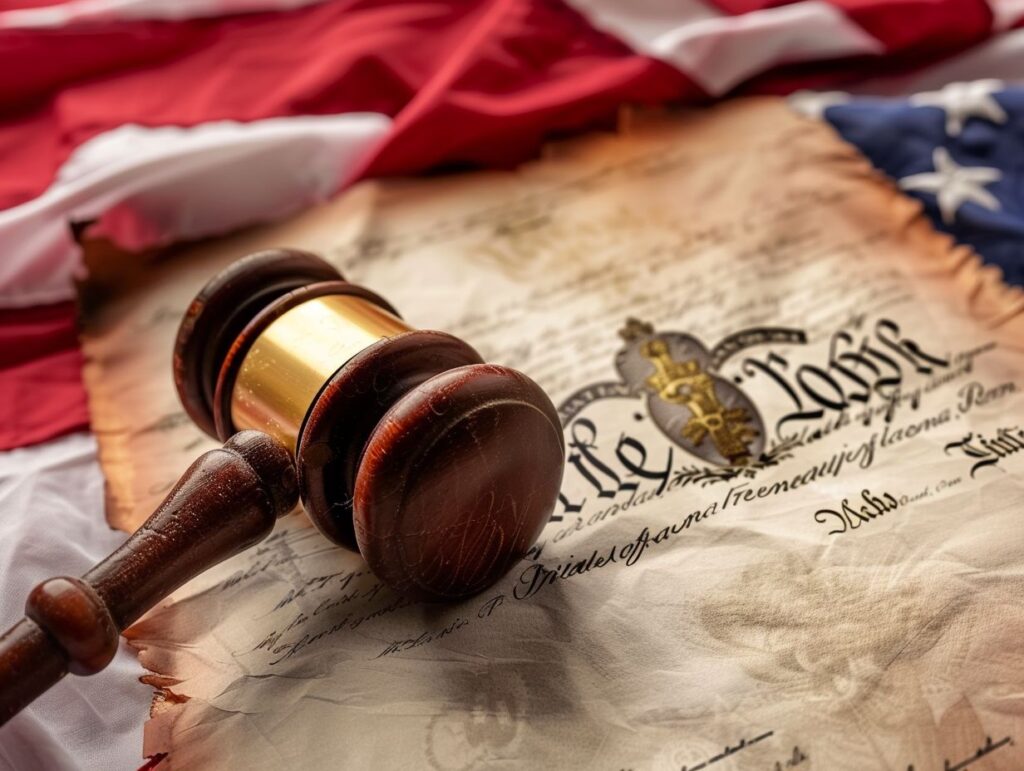Intellectual property is a valuable asset that can set your business apart from competitors. In Florida, there are various laws in place to protect intellectual property rights.
From patents to trademarks, copyrights to trade secrets, it’s crucial to understand how to safeguard your creations.
This article will explore the different types of intellectual property, why it is important, an overview of intellectual property laws in Florida, how to protect your intellectual property, and common disputes that may arise.
Let’s dive in and learn more about how to navigate the world of intellectual property in Florida.
Key Takeaways:

- Intellectual property refers to creations of the mind, such as inventions, designs, and artistic works, that are protected by law in Florida.
- Florida’s intellectual property laws cover various forms of protection, including patents, trademarks, copyrights, and trade secrets.
- To protect your intellectual property in Florida, it is important to register it, enforce your rights, and consult with a lawyer for guidance on common disputes such as infringement and misappropriation.
What is Intellectual Property?
Intellectual property (IP) consists of creations of the mind, like inventions, literary and artistic works, designs, symbols, names, and images used in commerce. These creations are safeguarded by various laws to ensure that creators receive acknowledgment and economic benefits.
Innovators and artists dedicate time, effort, and resources to developing these IP assets, which can manifest in diverse forms. Inventions, whether they involve groundbreaking technology or new processes, play a crucial role in advancing progress and enhancing our lives.
Artistic works, such as paintings, music, and literature, enhance our cultural panorama and evoke emotions. Brand logos and symbols act as distinct identifiers for companies, aiding consumers in differentiating between products and strengthening brand loyalty.
Safeguarding these creations through patents, copyrights, and trademarks is essential for protecting the interests of creators and promoting a culture of innovation and creativity.
Types of Intellectual Property
Various types of intellectual property exist, each providing unique forms of protection and advantages to creators and businesses. These include patents, trademarks, copyrights, and trade secrets.
1. Patents
Patents are legal protections granted to inventors for their inventions, providing them with exclusive rights to use, make, and sell the invention for a specified period, typically 20 years, regulated by the United States Patent and Trademark Office (USPTO).
The process of obtaining a patent involves submitting a detailed application to the USPTO, including a thorough description of the invention and its uniqueness. Inventions eligible for patent protection can range from new machines and processes to improvements on existing products or methods.
The USPTO plays a crucial role in examining patent applications to ensure they meet the necessary criteria for approval, such as novelty, usefulness, and non-obviousness. Once granted, patent holders must enforce their rights against infringement, protecting their intellectual property from unauthorized use.
2. Trademarks
Trademarks are symbols, logos, or phrases that are legally registered or established by use to represent a company or product. They are important for safeguarding brand identity and preventing trademark infringement.
These distinct marks play a crucial role in building brand recognition in the market. By registering trademarks with the United States Patent and Trademark Office (USPTO), businesses secure exclusive rights to their marks, prohibiting others from using similar marks for similar goods or services.
The registration process entails a comprehensive evaluation of the mark’s uniqueness and its eligibility for protection. In cases of trademark infringement, legal actions such as cease and desist orders, monetary damages, and injunctions are available to uphold the rights of the trademark owner.
3. Copyrights
Copyrights offer creators of literary and artistic works, such as books, music, and films, exclusive rights to use and distribute their creations, overseen by the U.S. Copyright Office.
This protection enables creators to derive financial benefits and exercise control over the use or reproduction of their works. To secure copyright protection, creators must express their work in a tangible medium, such as writing it down or recording it. Although copyright protection is inherent upon creation, registering the copyright with the U.S. Copyright Office confers additional advantages.
Registration provides the creator with legal proof of ownership, simplifying the enforcement of their rights in cases of infringement. Copyright infringement can result in legal repercussions, including financial liabilities and restraining orders.
4. Trade Secrets
Trade secrets are a type of confidential business information that gives a competitive advantage and is protected by laws like the Defend Trade Secrets Act to prevent unauthorized use or disclosure.
These trade secrets can include a variety of knowledge, such as formulas, processes, techniques, or customer lists that are not publicly known or shared with competitors. Businesses rely on these protected secrets to stay ahead in the market and protect their innovations from being taken advantage of by others.
The legal frameworks surrounding trade secrets give companies options if their information is misused. This allows them to pursue damages and injunctions against individuals or entities that wrongfully obtain or disclose their proprietary information.
Why is Intellectual Property Important?

Intellectual property is important as it protects the creations and innovations of businesses and individuals. This helps to create an environment that fosters creativity, offers a competitive edge, and stimulates economic growth.
It plays a crucial role in encouraging innovation by motivating creators to dedicate time, resources, and energy to developing new ideas, products, and technologies. By safeguarding these intellectual assets through patents, trademarks, copyrights, and trade secrets, individuals and businesses can be confident that their innovative work will be protected and rewarded, preventing unauthorized use.
This not only benefits the creators by enabling them to benefit from their efforts but also benefits society as a whole by driving continuous progress and enhancements across various industries.
Overview of Intellectual Property Laws in Florida
Intellectual property laws in Florida cover both state and federal regulations aimed at safeguarding the rights of creators and businesses. Entities like the Lomnitzer Law Firm and the United States Supreme Court play crucial roles in interpreting and enforcing these laws.
1. Florida’s Uniform Trade Secrets Act
The Florida Uniform Trade Secrets Act offers legal protection for trade secrets, assisting businesses in safeguarding their confidential information to prevent misappropriation or unauthorized disclosure.
This legislation establishes clear guidelines for defining trade secrets and details the legal remedies available in cases of misappropriation. By enabling companies to safeguard their valuable information, this law promotes innovation and the advancement of new technologies.
Through the enforcement of this act, individuals and organizations have a legal framework to pursue damages and injunctions against those who unlawfully obtain, use, or disclose their trade secrets. Ultimately, the Florida Uniform Trade Secrets Act plays an important role in fostering a competitive and secure business environment.
2. Florida’s Patent Law
Florida’s patent law aligns with federal regulations from the United States Patent and Trademark Office to ensure inventors receive comprehensive protection for their innovations.
This cooperative relationship between state and federal laws is essential for safeguarding the intellectual property rights of inventors in Florida. The patent registration process involves submitting a detailed application to the USPTO, which evaluates the novelty and inventiveness of the invention.
Upon approval, a patent grants exclusive rights to the inventor, permitting them to control the making, using, and selling of their invention without authorization.
This protection incentivizes innovation and investment in research and development in the state, fostering an environment of creativity and resourcefulness in Florida.
3. Florida’s Trademark Law
The trademark law in Florida is overseen by the Division of Corporations with the goal of safeguarding businesses’ brand identity. This is achieved by preventing trademark infringement and guaranteeing the sole use of registered symbols and logos.
Registering a trademark in Florida entails submitting an application to the Division of Corporations, where the uniqueness and distinctiveness of the mark are assessed. Upon approval, the trademark owner obtains exclusive rights to utilize that mark in commerce.
In situations involving infringement, Florida’s law offers legal solutions like injunctive relief, damages, and attorney’s fees to handle unauthorized use of a registered trademark.
4. Florida’s Copyright Law
The copyright law in Florida is in line with federal regulations overseen by the U.S. Copyright Office, offering protection for literary and artistic works produced within the state.
When creators in Florida want to protect their rights, they have the option to register their original works with the U.S. Copyright Office, a process that confirms their ownership and comes with legal advantages.
This procedure includes submitting an application, a copy of the work, and the necessary fee. Once registered, the creator obtains exclusive rights to reproduce, distribute, display, and perform their work.
In cases of copyright infringement, the law permits legal actions such as pursuing damages, injunctions, and potentially criminal charges for severe violations.
How to Protect Your Intellectual Property in Florida?
Protecting intellectual property in Florida entails a mix of registration, enforcing rights diligently, and pursuing suitable legal remedies to secure creations from infringement and unauthorized use.
1. Registering Your Intellectual Property

Registering intellectual property with relevant authorities like the United States Patent and Trademark Office, the U.S. Copyright Office, and the Division of Corporations is a critical step in obtaining legal protection for creations. Each type of intellectual property, including patents, trademarks, and copyrights, follows a specific registration process.
For patents, inventors must submit a detailed application describing their invention to the USPTO. Trademarks, conversely, are registered by submitting an application that includes the mark’s design and the goods/services it will represent. Copyright registration involves submitting a copy of the work to the U.S. Copyright Office.
These registrations offer tangible benefits, such as exclusive rights to use and profit from creations, along with legal recourse against infringement. The authorities have a key role in reviewing applications, granting protection, and upholding the rights of intellectual property owners.
2. Enforcing Your Rights
Protecting your intellectual property rights involves actively monitoring for infringement and taking legal action when necessary to safeguard your creations and uphold your exclusive rights.
By diligently monitoring the market for unauthorized use of your creations, you can identify potential infringers and gather evidence to support your claims. Various methods, such as conducting regular searches online, monitoring trade publications, attending industry events, and utilizing software tools like plagiarism detectors, can aid in detecting infringement.
When infringement is detected, legal remedies such as cease and desist letters, negotiation of licensing agreements, mediation, arbitration, or ultimately, litigation, can be pursued to address violations and safeguard your intellectual property rights.
3. Consulting with an Intellectual Property Lawyer
Seeking guidance from an experienced intellectual property lawyer, such as those at the Lomnitzer Law Firm, can offer valuable legal protection and assistance in dealing with intricate IP matters and conflicts.
These legal professionals provide personalized advice to individuals or businesses regarding the protection of their unique ideas, inventions, and brands. Whether it involves trademark registrations or copyright infringements, having a capable attorney by your side ensures the safeguarding of your intellectual creations.
Legal assistance becomes crucial in instances of potential infringement or disputes, where expert analysis and representation are essential. Specialized law firms like Lomnitzer Law Firm possess the expertise and resources to effectively address IP conflicts and uphold your rights in a competitive market.
Common Intellectual Property Disputes in Florida
Frequent intellectual property disputes in Florida commonly involve matters like infringement, misappropriation, and breach of contract, which pose challenges to the protection and utilization of different IP assets.
1. Infringement
Infringement refers to the unauthorized use, reproduction, or sale of protected intellectual property, which can pertain to trademarks, copyrights, or patents.
This unauthorized utilization not only violates the rights of the intellectual property owners but also carries significant financial and reputational risks. For instance, in cases of copyright infringement, creators may lose out on royalties and recognition for their original work.
To address infringement, legal actions such as sending cease and desist letters, attempting mediation, or initiating a lawsuit can be pursued. Intellectual property owners have the option to seek remedies such as damages, injunctions, or potentially even pursuing criminal charges against infringers to safeguard their creations and discourage future violations.
2. Misappropriation
Misappropriation of intellectual property involves the unauthorized use of trade secrets, often addressed under laws like the Defend Trade Secrets Act, which provides legal recourse for businesses to protect their confidential information.
Such unauthorized use can have significant consequences for businesses, leading to lost market advantage, diluted brand value, and potential financial losses. To prevent misappropriation, companies can utilize various legal frameworks such as patents, copyrights, trademarks, and trade secrets.
These frameworks not only safeguard intellectual property assets but also grant exclusive rights to the owners, allowing them to take legal action against infringers. By understanding and implementing these legal protections, businesses can better protect their innovations and maintain a competitive edge in the market.
3. Breach of Contract
A breach of contract in the context of intellectual property typically involves the violation of agreed terms regarding the use, confidentiality, or ownership of IP assets, leading to legal disputes.
This breach can occur when one party fails to uphold their end of the contract by infringing on the intellectual property rights of the other party, such as using patented technology without permission or disclosing confidential information to unauthorized third parties.
These breaches can have significant repercussions, causing financial losses, damage to reputation, and loss of competitive advantage for the affected parties. In such situations, legal remedies like damages, injunctions, or specific performance orders may be sought to resolve the disputes and enforce the terms of the contract.
Frequently Asked Questions

What is intellectual property?
Intellectual property refers to creations of the mind, such as inventions, literary and artistic works, symbols, names, and images used in commerce. These creations can be protected by law, giving the creator exclusive rights to use and profit from their work.
What types of intellectual property are protected under Florida law?
Florida law protects various types of intellectual property, including patents, trademarks, copyrights, and trade secrets. These protections help individuals and businesses safeguard their unique ideas, creations, and products.
How do I obtain a patent in Florida?
In order to obtain a patent in Florida, you must file an application with the United States Patent and Trademark Office (USPTO). This application must include a detailed description and drawings of your invention, as well as an explanation of how it is unique and useful.
Do I need to register my trademark in Florida?
No, but it is highly recommended. While trademark rights are automatically acquired through use in commerce, registering your trademark with the Florida Department of State can provide additional protections and benefits, such as nationwide notice of ownership and the ability to bring legal action against infringers.
What is the duration of copyright protection in Florida?
The duration of copyright protection in Florida is typically the life of the creator plus 70 years after their death. However, this can vary depending on the type of work and when it was created. It is recommended to consult with an intellectual property lawyer for specific information on copyright duration for your work.
What should I do if my intellectual property rights are infringed upon in Florida?
If you believe your intellectual property rights have been infringed upon in Florida, it is important to take action immediately. This may include sending a cease and desist letter, filing a lawsuit, or seeking mediation or arbitration. Consulting with an experienced intellectual property lawyer can help you determine the best course of action for your specific situation.























Rate this article:
Average rating 0 / 5. Vote count: 0
No votes so far! Be the first to rate this post.
No Comments yet!